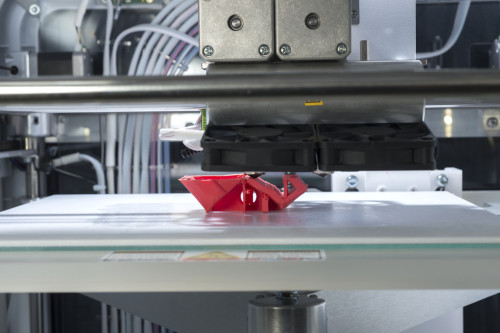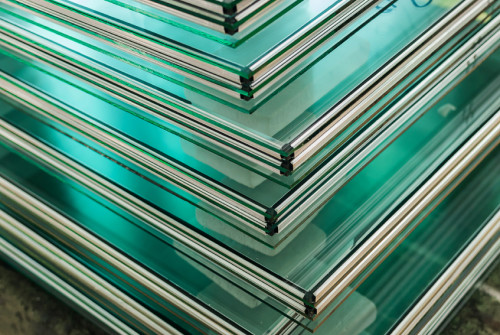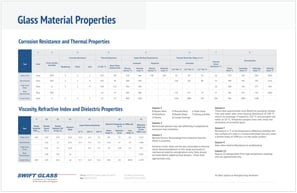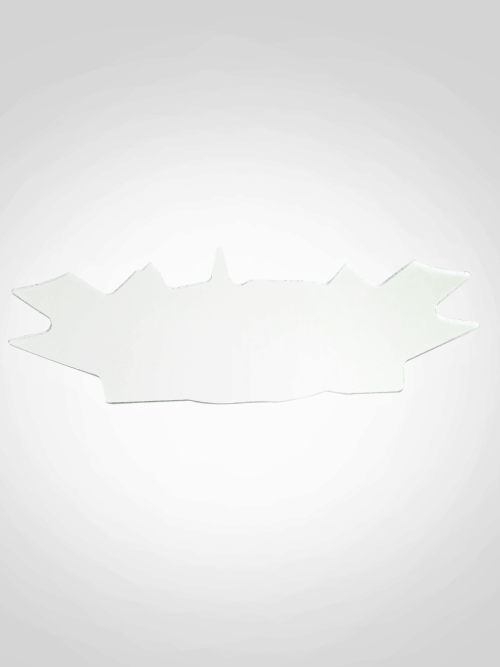Category Archive: Glass Manufacturing
3D printing, also called additive manufacturing, is rapidly transforming industrial manufacturing as we know it.
Initially used to create models and prototypes, 3D printing is now increasingly being used to construct finished products.
 In the near future, this technology will hold the power to manufacture food, cars, implants, and even soft tissue organs.
In the near future, this technology will hold the power to manufacture food, cars, implants, and even soft tissue organs.
The 3D printing process uses computer-automated layering of material to create a three-dimensional object. Just about any material available in liquid or powder form can be 3D printed. The industrial robots performing the layering can be programmed with complex shapes and geometries to produce a diverse range of parts with extreme precision and detail.
Where Does Glass Fit In?
During the 3D printing process, the object being created requires a platform on which to rest. Because of the high temperatures experienced during 3D printing, this plate must be made from durable, heat-resistant materials.
Borosilicate – a glass substance constituted of silica and boron oxide – is the material of choice for these applications. An extremely low coefficient of thermal expansion makes borosilicate more resistant to thermal shock than any other common glass. Even when exposed to high temperatures (up to 500°F or 260° C), borosilicate remains durable and clear without losing functionality.
Get More Information from Swift Glass
Swift Glass has been a worldwide leader in custom glass fabrication for almost 100 years. In addition to waterjet cutting, glass tempering, polishing, grinding, lapping, and drilling services, we offer a variety of borosilicate and infrared reflecting borosilicate (IRR) glass from major manufacturers such as Corning and Schott.
For more information about Swift Glass and our offering of glass for 3D printing, please visit our borosilicate materials page. You can also check out our latest eBook about strengthened glass called Creating Glass That Withstands Extreme Environments.

High-intensity industrial processes call for durable equipment that will prove resistant in the face of even the toughest of applications.
 If you’re carrying out procedures against harsh or extreme conditions, it’s essential that your application is equipped with the proper glass component. Tempered safety glass in windshields, for example, provides extra security in the event of breakage.
If you’re carrying out procedures against harsh or extreme conditions, it’s essential that your application is equipped with the proper glass component. Tempered safety glass in windshields, for example, provides extra security in the event of breakage.
High performance glass is required to withstand a vast range of pressures, elements, and external factors, each of which vary by industry. When operating in high intensity environments susceptible to extraneous factors, it’s important to be aware of common concerns that can arise.
Below are a few common risks associated with extreme industrial climates, along with the glass strengthening solutions that help reduce those risks:
High-Pressure Exposure
One of the most frequently noted stress points for high performance glass, this can manifest itself in marine, architectural, and even aeronautical environments.
Strengthened glass, however, can help prevent or reduce the adverse effects of high pressure. In addition, strengthened glass helps shield your work environment from harm caused by explosions, bullets, and projectile aftermath, each of which may pose a threat to safety and productivity. Safety glass offerings, like tempering, can help to ensure a less devastating effect upon impact than with regular glass.
Extreme Temperatures
Exposure to extreme temperatures can result in potentially adverse effects upon operations. Fortunately, heat-treated glasses can offer dramatically increased protection against hazards like thermal shock. Heat treatment offers glass—a material often susceptible to high temperatures—increased protection against high-temperature breakage.
Harsh Environments
Exposure to intense, abrasive elements or harsh, wet and extreme environments holds the potential to work against high performance glass. For certain extreme or outdoor environments, heat-tempered glass may not be necessary, but it can provide exceptional resistance against thermal stresses and extreme wind pressure. Fully tempered glass, however, can offer unparalleled safety when it comes to ensuring safety break pattern. If operations are under harsh weather conditions, tempered glass ensures your work environment remains both active and safe.
Learn More in Our eBook
At Swift Glass, we’re dedicated to providing consumers with the high quality materials they need for safe, efficient, and effective day-to-day procedures. For additional information regarding glass strengthening solutions, access our new eBook titled Creating Glass That Withstands Extreme Environments.

ELMIRA, N.Y. — January 2016 — Swift Glass, a worldwide leader in the manufacturing of quality fabricated custom glass parts, has purchased the FJ Gray Division of Gray Glass in Queens Village, New York.
The FJ Gray Division comprises the industrial, optical, specialty lighting, and educational glass fabrication segments of Gray Glass. Swift Glass began to fabricate, ship, and invoice work for FJ Gray on January 1, 2016. All new order processing, quotes, and product fabrication will now take place at the FJ Gray Division of Swift Glass Company in Elmira Heights, New York.
Since 1946, FJ Gray and Company has been a leading global custom glass specialist offering precision glass and industrial glass products. For Swift Glass customers, this acquisition brings a lineup of product offerings that complement their existing capabilities, including tempered glass, scientific glassware, gauge glass, tubing and rod, borosilicate, welder’s glass, and a host of other specialty glass products.
FJ Gray has extensive experience working with engineers, scientists, designers, and OEMs like Boeing, NASA, the US Military, the US Government, and a number of large corporations engaged in scientific research, aviation, and aerospace.
About Swift Glass
Swift Glass is a privately owned worldwide leader in the manufacturing of quality fabricated glass parts.
An ISO 9001:2008 certified and ITAR registered company, Swift Glass offers assistance in material selection, craftsmanship, design and custom solutions while possessing the utmost devotion to precision and quality.
Glass manufacturing capabilities include chemical strengthening, thermal tempering, polishing, edge grinding, drilling and more. Swift Glass works with leading glass manufacturers such as Corning, Schott and GE and stocks a wide range of materials that allow us to respond quickly to customer needs.
Glass is among the most versatile of materials. Depending on its composition, treatment, and manufacture, it can be customized for high performance in countless applications.
 In order to get the right fit for your next glass project, remember to consult properties such as the corrosion resistance, thermal properties, viscosity, dielectric properties and refractive index of potential materials. These properties tell a lot about how a material reacts to its environment, which is especially important for your application’s performance.
In order to get the right fit for your next glass project, remember to consult properties such as the corrosion resistance, thermal properties, viscosity, dielectric properties and refractive index of potential materials. These properties tell a lot about how a material reacts to its environment, which is especially important for your application’s performance.
Sample Material: Borosilicate
When compared to other types of glass, borosilicate has a high corrosion resistance to acid, but a low corrosion resistance to weathering. Its thermal expansion is very low, and its volume resistivity and thermal shock resistance are both high — but not the highest. Its light transmission is excellent.
Pyrex® and Borofloat® are common types of borosilicate, though both Schott and Corning craft a series of variations with increasingly specific properties.
What does all of that mean?
Because of its resistance to high temperatures and chemical corrosion, borosilicate makes an excellent material for the biomedical and research industries. It’s also an ideal material for optical, lighting and industrial applications.
Because this is a glass that demonstrates strength without being the absolute strongest, borosilicate is an affordable material, making it extremely popular in many industries. Of all possible glass materials, it’s the Swift Glass choice for all of our annular edge glass. Its edges can be ground specially to be sealed in a flange for biomedical, research, optical, optoelectronic, photonics and analytical applications.
Other Material Options
For the toughest situations, traditional glass materials may not be enough — no matter how naturally strong. Thermal tempering and chemical strengthening can further prepare glass for high-intensity applications, such as:
- High Pressure Windows
- Explosion-Proof Windows
- Lighting Products
- Industrial and Residential Doors
The additional safety and dependability offered by tempered glass serves many industries, from automotive to medicine.
Resources for Selecting Materials
For quick reference, the Swift Team has assembled a Glass Material Properties Chart addressing some of our most popular material choices, ranging all the way from soda lime glass to fused silica. We also offer material consulting from our team of experts, as well as tempering services for specialty projects.
Download the Glass Material Properties Chart now, or contact the team to learn more today.

What happens when you need glass cut into something like the shape to the right?
 Precision glass manufacturers utilize a variety of technologies to craft even the strangest of shapes that require clean edges, precise spheres and smooth surfaces.
Precision glass manufacturers utilize a variety of technologies to craft even the strangest of shapes that require clean edges, precise spheres and smooth surfaces.
The glass mirror piece in the photo to the right is one example. Precision manufacturers like Swift Glass utilize a variety of techniques to achieve difficult configurations like this one.
Before you dismiss your drawing as too difficult, check out some of the capabilities that glass manufacturers are leveraging today:
Waterjet Technology for Precision
The highly pressurized stream of water from a waterjet cutter provides an exceptionally smooth and controllable tool. These cutters can automatically switch from low to high pressure mode in the midst of a single tool path, allowing for specialized cuts at high speeds — even in the most brittle glass.
Our waterjet cutters work with CAD compatible software, integrating drawings seamlessly and efficiently from original concept to final product.
Our tools can cut virtually any shape down to 0.5mm thick, and can handle glass materials up to 9 inches thick. High pressure waterjet cutters create pinpoint accuracy smoothly cutting holes, notches and details without damage or distortion.
Irregular shape water jet cutting works well for quartz, optical glass, fused silica, Borofloat®, Pyrex®, and many other specialty materials.
CNC Machining for Tough Glass Materials
Three- and four-axes diamond tooling technology allows manufacturers to cut the toughest materials, including quartz and high-pressure gauge glass. These glass milling solutions serve a range of industries, from optical and lighting to aerospace and energy.
Glass Drilling for Unique Projects
Many businesses require glass doors, mirrors, or furniture with functional or decorative holes. Glass manufacturers use high precision hole drilling to meet exact dimensions and specifications. Diamond-tipped drill bits have the ability to cut holes perfectly with very close tolerances, for materials up to 1.25 inches thick.
Swift Glass is one of the nation’s leading manufacturers of fabricated glass parts, including reliable cutting solutions for glass shapes of all kinds. With over two decades of experience in custom water jet cutting, we can confidently promise both versatility and precision for even the most intricate projects.
Ornamental components, solar panels, gauges, wafers, and explosion-proof glass are all fabrication projects that the Swift Glass Team has handled for customers. Access our library of Standards and Specifications for more information about the requirements we can meet.

Swift Glass will be joining its glass manufacturing peers at the prestigious SPIE Optifab 2015 exhibition and conference next week in Rochester, New York.

The SPIE Optifab exhibition is the largest optical fabrication event in North America and acts as a forum to share and discuss the latest techniques and tools for the optical fabrication industry.
The event includes over 100 technical talks, covering glass manufacturing topics such as grinding and polishing, optical fabrication of freeform surfaces, metrology, optical materials, cleaning and coating, optical design, optical engineering, meter-class optics, and molded optics.
Swift Glass will be bringing our knowledge of glass fabrication to the forefront in our own exhibition. We will showcase a piece of chemically-straightened glass at Booth 504, and will have a team of highly skilled and experienced employees on hand to answer questions and provide information about the capabilities that we specialize in.
Optifab 2015 takes place from October 12-15 at the Joseph A. Floreano Rochester Riverside Convention Center, located at 123 E Main St. in Rochester, New York. Presentations will run from 8am until 6pm, daily.
Come join us in celebrating optical fabrication and learn about all the capabilities and materials Swift Glass works with. Contact us today to learn more about the event.
 In the near future, this technology will hold the power to manufacture food, cars, implants, and even soft tissue organs.
In the near future, this technology will hold the power to manufacture food, cars, implants, and even soft tissue organs.


 If you’re carrying out procedures against harsh or extreme conditions, it’s essential that your application is equipped with the proper glass component. Tempered safety glass in windshields, for example, provides extra security in the event of breakage.
If you’re carrying out procedures against harsh or extreme conditions, it’s essential that your application is equipped with the proper glass component. Tempered safety glass in windshields, for example, provides extra security in the event of breakage.


 Precision glass manufacturers utilize a variety of technologies to craft even the strangest of shapes that require clean edges, precise spheres and smooth surfaces.
Precision glass manufacturers utilize a variety of technologies to craft even the strangest of shapes that require clean edges, precise spheres and smooth surfaces.


